A fierce war of words keeps Thailand and Cambodia on edge

A fragile ceasefire between Thailand and Cambodia has held even as they trade fresh accusations every day
- Published
The guns along the forested Thai-Cambodian border have been silent for three weeks now.
But a fierce war of words is still being waged by both countries, as they seek to win international sympathy and shore up public support at home. And a commonly-held view in Thailand is that they are losing.
"The perception is that Cambodia has appeared more agile, more assertive and more media savvy," said Clare Patchimanon, speaking on the Thai Public Broadcasting Service podcast Media Pulse. "Thailand has always been one step behind."
The century-old border dispute dramatically escalated with a Cambodian rocket barrage into Thailand on the morning of 24 July, followed by Thai air strikes.
Since then an army of Cambodian social media warriors, backed by state-controlled English language media channels, have unleashed a flood of allegations and inflammatory reports, many of which turned out to be false.
Why are Thailand and Cambodia fighting at the border?
- Published27 July
They reported that a Thai F16 fighter jet had been shot down, posting images of a plane on fire falling from the sky - it turned out to be from Ukraine. Another unfounded allegation, that Thailand had dropped poison gas, was accompanied by an image of a water bomber dropping pink fire retardant. This was really from a wildfire in California.
Thailand responded with official statements of its own, but often these were just dry presentations of statistics, and they came from multiple sources – the military, local government, health ministry, foreign ministry - which did not always appear to be coordinating with each other.
Bangkok failed to get across its argument that Cambodia, whose rockets marked the first use of artillery and had killed several Thai civilians, was responsible for the escalation.
It is no secret that the elected Thai government, centred on the Pheu Thai party of controversial billionaire Thaksin Shinawatra, has an uneasy relationship with the Thai military.
That was made much worse in June when Hun Sen, the former Cambodian leader and an old friend of Thaksin's, decided to leak a private phone conversation he had with Thaksin's daughter, Prime Minister Paetongtarn Shinawatra. She had appealed to him to help resolve their differences over the border, and complained that the Thai army general commanding forces there was opposing her.
The leak caused a political uproar in Thailand, prompting the constitutional court to suspend her, and badly weakening the government just as the border crisis escalated.
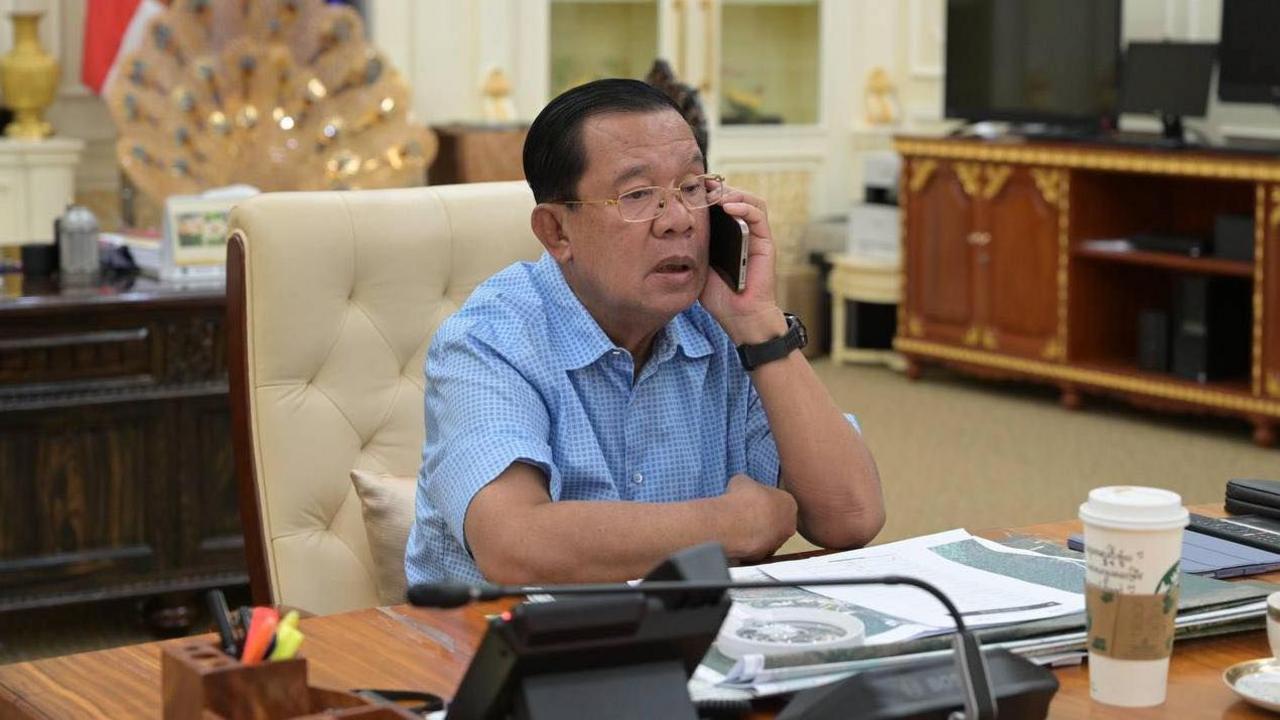
Cambodia's former leader Hun Sen has taken to Facebook regularly to accuse the Thais of violating the ceasefire
Hun Sen has no such difficulties. Technically he has handed power to his son, Hun Manet, but after running the country for nearly 40 years it is clear he still holds the reins.
The army, the ruling party and the media are firmly under his control. His motives for burning his friendship with the Shinawatras are unclear, but it seems he was preparing for a larger conflict over the border.
From the start Hun Sen posted constantly, in Khmer and English, on his Facebook page, taunting the Thai government, along with photos that showed him in army uniform or poring over military maps.
By contrast the most visible figure on the Thai side has been the mercurial 2nd Army commander Lt. Gen Boonsin Padklang. He is the same officer Paetongtarn had complained about, and his bellicose nationalism has won him plenty of fans in Thailand but has also undermined the government's authority.
"Hun Sen is very smart," says Sebastian Strangio, author of Hun Sen's Cambodia, a definitive account of the way his leadership has shaped the country.
"He has used this asymmetrical tactic of widening the divisions that already exist in Thailand. And the fact that Cambodia is so good at playing the victim has given it another powerful weapon against Thailand in the international arena."
Thai officials admit they are struggling to counter the tactics used by the Cambodian side.
"This is totally different from how information wars have been waged before," Russ Jalichandra, vice-minister for foreign affairs, told the BBC.
"What we are saying must be credible and able to be proved. That's the only weapon we can use to fight in this war. And we have to stick to that even though it seems sometimes we are not fast enough."
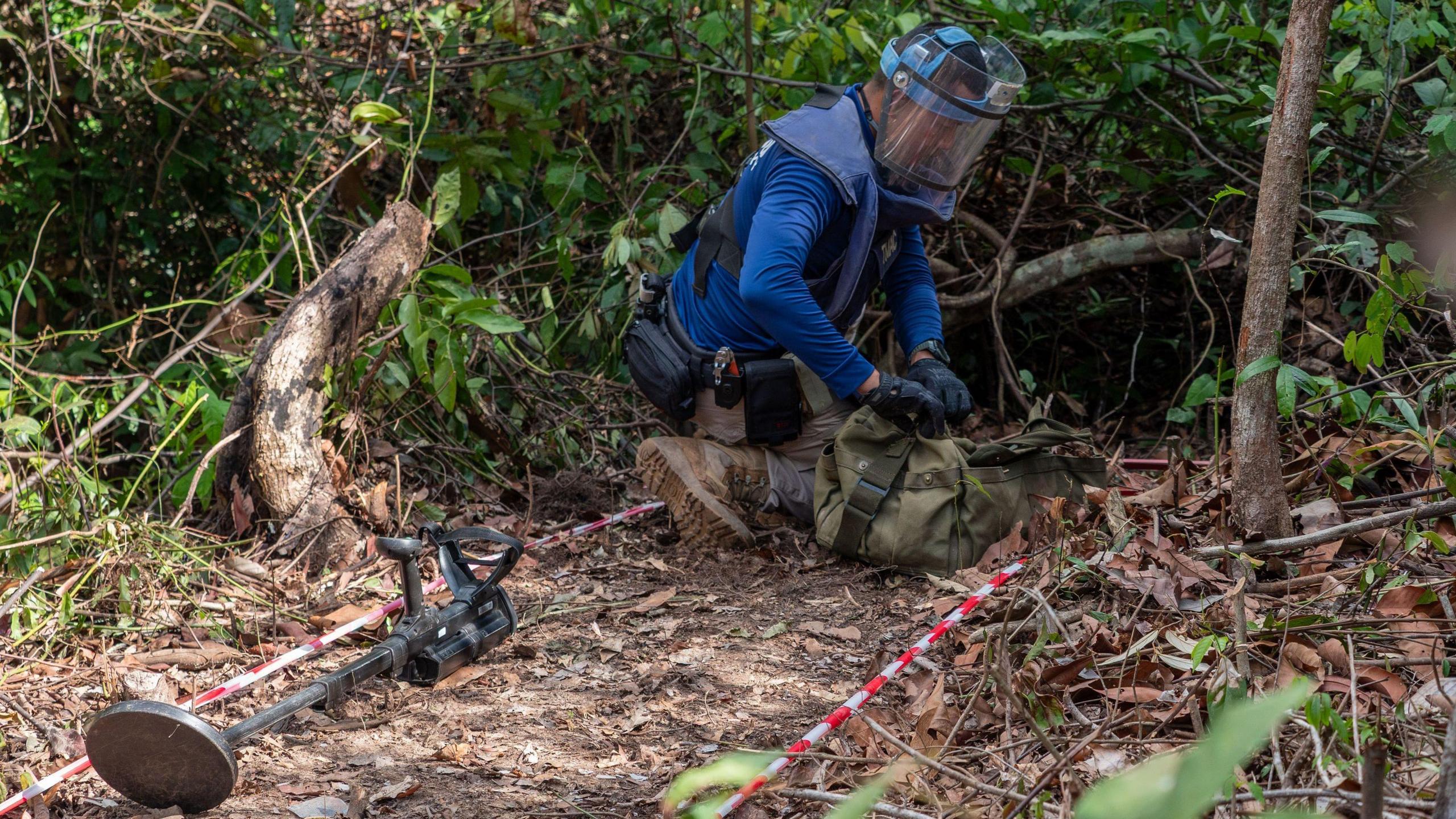
A Thai explosives expert demonstrates how to detect mines close to where a Thai soldier was injured by a landmine on 9 August
Thailand has always insisted its border dispute with Cambodia should be resolved bilaterally, without outside intervention, using a Joint Boundary Commission the two countries established 25 years ago.
But Cambodia wants to internationalise the dispute. It was the first to refer the escalating conflict to the UN Security Council last month. It has also asked the International Court of Justice to rule on where the border should lie. This has presented Thailand with a dilemma.
The official reason Thailand gives for rejecting ICJ involvement is that like many other countries it does not recognise ICJ jurisdiction. But just as important is a Thai collective memory of loss and humiliation at the ICJ which cuts to the heart of the border dispute.
Both Thailand and Cambodia have enshrined national stories of unjust territorial losses.
In Cambodia's case it is the story of a once powerful empire reduced to poverty by war and revolution, and at the mercy of the territorial ambitions of its larger neighbours.
Thailand's is a more recent story of being forced to sacrifice territories in the early 20th Century to stave off French or British colonial rule. When Thailand agreed to a new border with French-occupied Cambodia, it allowed French cartographers to draw the map.
But when Cambodia became an independent state in 1953, Thai forces occupied a spectacular Khmer temple called Preah Vihear, or Khao Phra Viharn in Thai, perched on a cliff top which was supposed to mark the border.
The Thais argued that the French cartographers had erred in moving the border away from the watershed, the agreed dividing line, putting the temple in Cambodia.
Cambodia took the dispute to the ICJ, and won.
The court ruled that, whatever the map's flaws, Thailand had failed to challenge them in the preceding half century.
The then-Thai military ruler was shocked by the outcome, and wanted to attack Cambodia, but was persuaded by his diplomats to grudgingly accept the verdict.
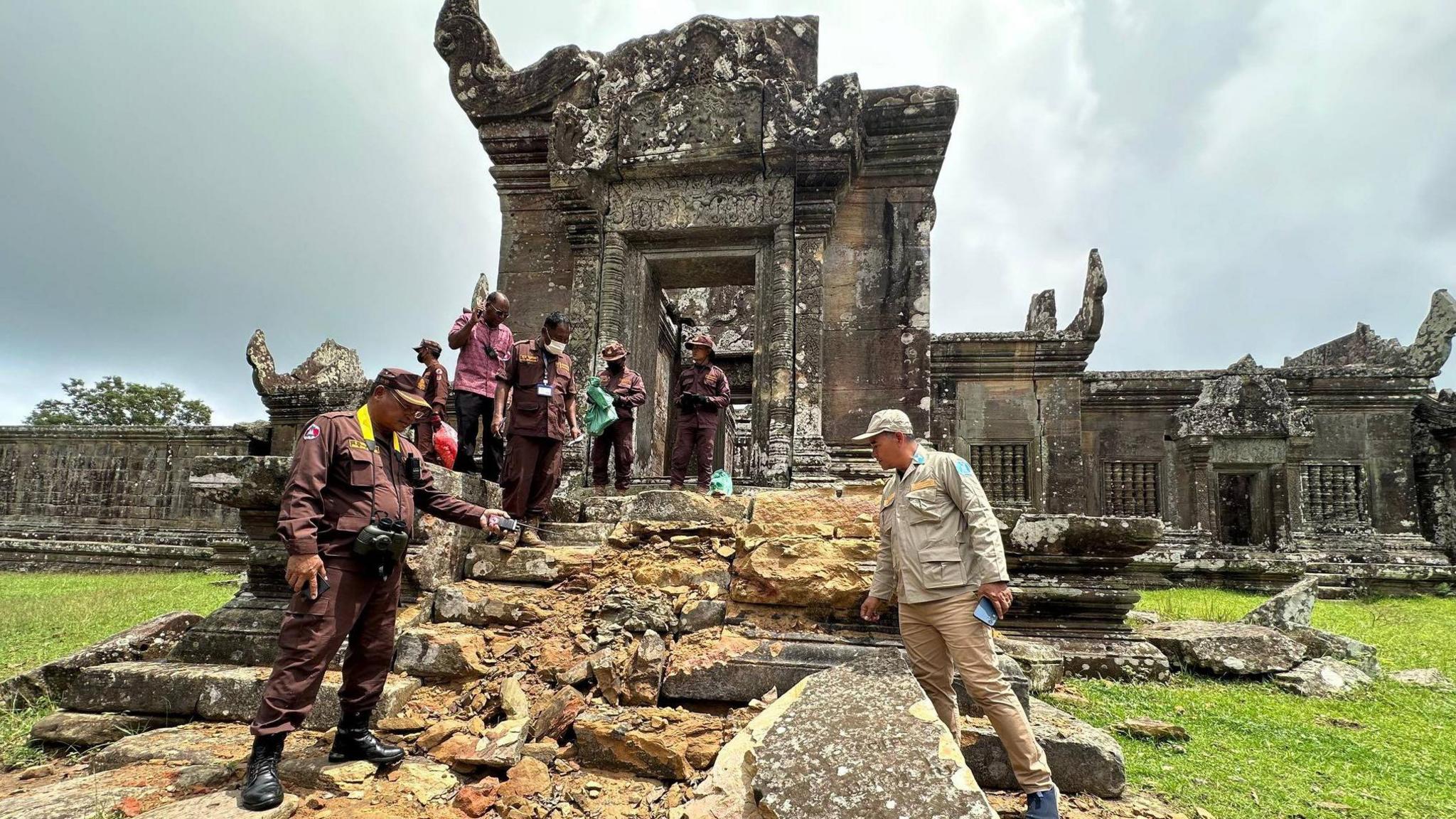
Cambodian officials point to what they allege is damage to the Preah Vihear temple from Thai shelling
Thailand's sensitivity over its 1962 loss now makes it politically impossible for it to accept an ICJ role in resolving the remaining border disputes.
That has allowed Hun Sen to portray Thailand as defying international law.
Thailand is now countering the Cambodian narrative with a more effective one of its own: the use of landmines.
Both countries are signatories to the Ottawa Convention banning the use of anti-personnel mines, and Cambodia has a traumatic legacy of being one of the most mined countries in the world, for which it has received a lot of overseas funding.
So Thailand's accusation that Cambodian soldiers have been laying new anti-personnel mines along the border, causing multiple injuries to Thai soldiers, is an awkward one for the government in Phnom Penh.
Initially Cambodia dismissed the allegation, saying these were old mines left from the civil war in the 1980s. The Thai government then took a group of diplomats and journalists to the border to show us what they have found.
Laid out on a table in the jungle, just a few hundred metres from the border, was a collection of munitions that Thai demining teams say they recovered from areas formerly occupied by Cambodian troops.
We were confined to a small clearing, marked off by red and white tape. Anywhere beyond that, they said, was unsafe. On the drive in along a muddy track we saw Thai soldiers in camouflaged bunkers hidden in the trees.
Among the munitions were dozens of thick, green plastic discs about the diameter of a saucer. These were Russian-made PMN-2 mines which contain a large quantity of explosives - enough to cause severe limb damage - and are difficult to deactivate. Some appeared to be brand new, and had not been laid.
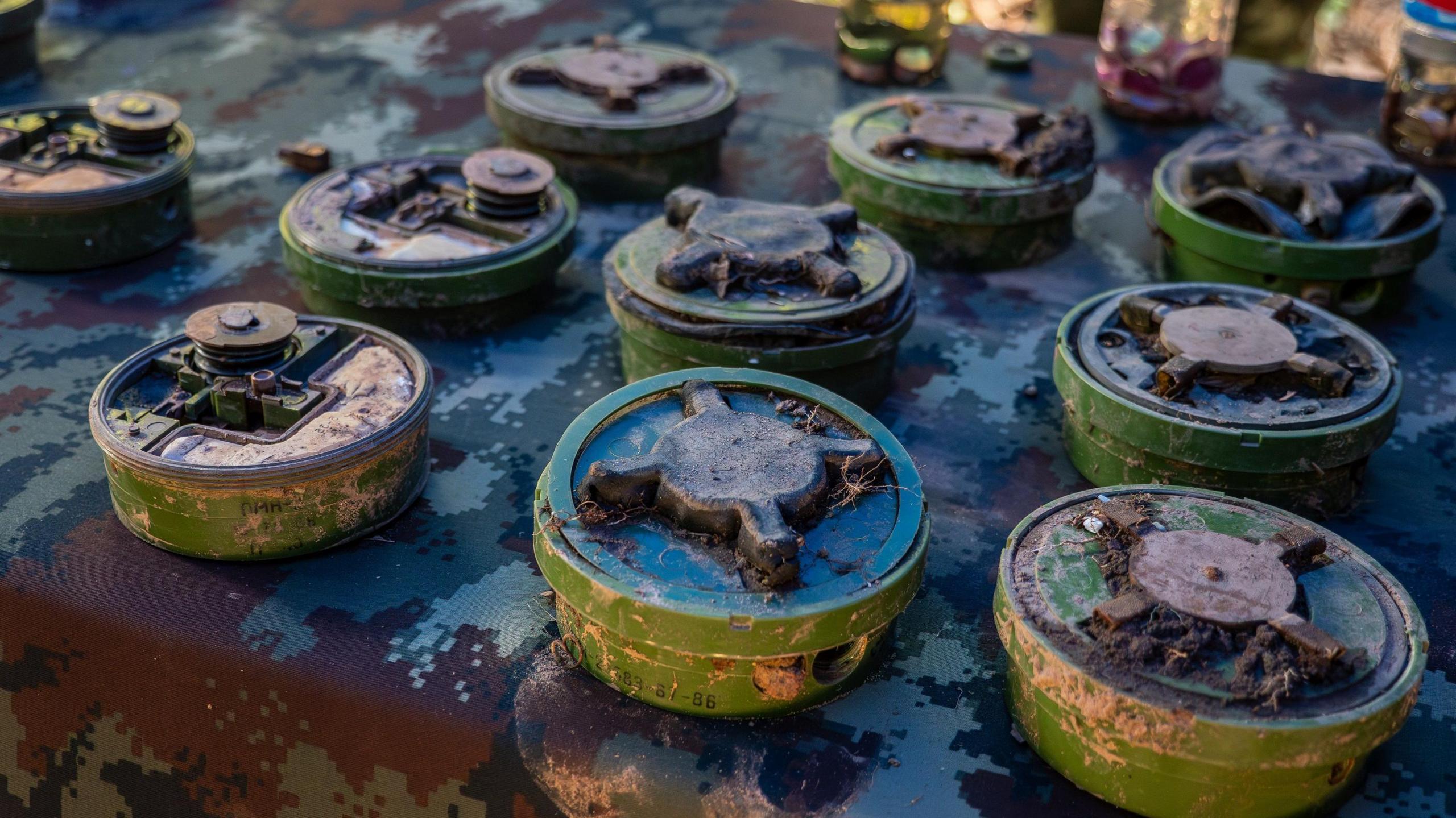
Russian-made PMN-2 mines the Thai army says were laid recently by Cambodian soldiers
The initial images of these prompted Cambodia to dismiss the Thai claims as unfounded because the arming pins had not been removed.
However, we were shown other mines which had been armed and buried, but clearly recently – not in the 1980s.
Thailand is calling for action against Cambodia by other signatories to the Ottawa Convention, and is asking countries which support demining programmes in Cambodia to stop funding them.
It argues that Cambodia's refusal to admit laying mines or to agree on a plan to remove them demonstrates a lack of good faith in resolving the border dispute.
Cambodia has fired back by accusing Thailand of using cluster munitions and white phosphorus shells, which are not banned but can also pose a threat to non-combatants; the Thai military has acknowledged using them but only, it says, against military targets.
Cambodia has also published pictures of what it says is damage to the Preah Vihear temple, a World Heritage Site, by Thai shelling, something that the Thai military has denied.
The incessant volleys of accusations from both countries make any progress on their border dispute unlikely.
Hun Sen and his son have benefited politically from being able to depict themselves as defenders of Cambodian soil, but the conflict has made the political challenges faced by the Thai government even worse.
It has stirred intense animosity between Thai and Cambodian nationalists. Hundreds of thousands of Cambodian migrant workers have left Thailand, which will hit an already struggling Cambodian economy.
"Both sides are describing the border as a sacred dividing line between their countries", says Mr Strangio. "The symbolism is hugely important. This cuts to very deep questions of national identity, and it's something that neither side can afford to take a step back from at the moment."
Read more about the Thai-Cambodia dispute
- Published29 July
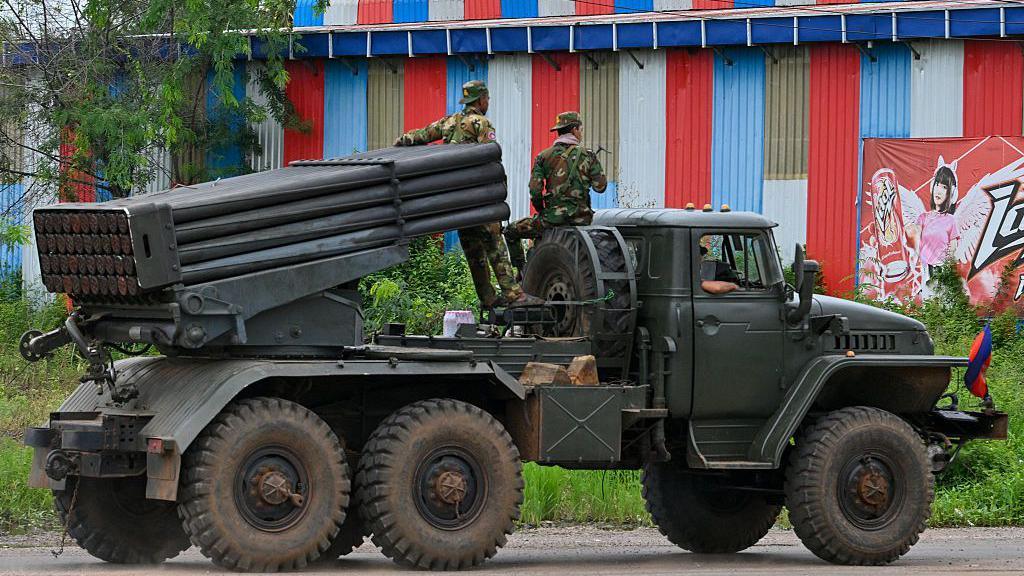
- Published1 July

